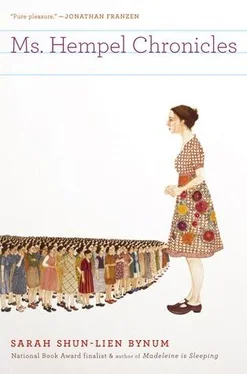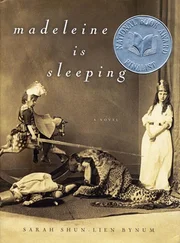Sarah Shun-lien Bynum
Ms. Hempel Chronicles
MANY OF MS. HEMPEL’S STUDENTS were performing in the show that evening, but to her own secret disappointment, she would not be appearing. All around her, she was confronted with reminders of the event: during morning assembly, an announcement (three eighth-grade girls bobbed up and bawled, in unison: Tickets on sale at the door!); pink flyers slapped crookedly onto the walls; a note from a parent: Please excuse Louisa, rehearsals ran late, she will turn it in on Monday.
Adelaide Burr cornered Ms. Hempel during homeroom and described her costume. Adelaide was an avid appreciator of dance. Her first book report had celebrated in a collage (dismembered limbs; blue glitter) the life and contributions of Martha Graham, and her second, a dramatic monologue, was based on a bestseller written by a ballerina who had suffered through several disastrous affairs and then developed a serious cocaine habit. Adelaide seemed excited by the lurid possibilities. “Just imagine!” she said to Ms. Hempel, and clapped her hands rapturously against her thighs, as though her shorts had caught fire. The bodies of Ms. Hempel’s students often did that: fly off in strange directions, seemingly of their own accord. Now Adelaide told her that she had choreographed a solo piece to Beethoven’s Moonlight Sonata. Balancing precariously, she said, on a kitchen footstool, she had peeled the glow-in-the-dark stars off the ceiling above her bed. “I have incorporated them into my dance,” she said mysteriously. She made Ms. Hempel promise that she would come.
The building hummed throughout the day: older girls came leaping down the stairs, fishnet stockings streaming behind them like pennants. Mr. Spiegelman, his yarmulke slightly askew, heaved the grand piano into the auditorium. From the bowels of the science wing, a trombone bleated out a solitary, echoing rendition of “Luck Be a Lady.” When Ms. Hempel went into the bathroom, she saw pots of lip gloss perched along the edges of the sinks. The girls hadn’t taken off their makeup since the run-through that morning, and all day their faces had squirmed self-consciously, their sticky black eyelashes batting, their shiny mouths twitching over their teeth. It was all new to them.
Before the show, Ms. Hempel groped around the bottom of her pocketbook and found a tube of lipstick she had left there long ago. The shade was a glamorous brown, and as she hid in the faculty lounge, crouching over her compact, she thought, Narcissistic, and then corrected herself. Vain was more accurate, although not a vocabulary word. Colorless was perhaps even more precise. She rubbed a finger vigorously over her teeth: there were parents waiting outside the auditorium, herded together like hungry and disconsolate cattle; she would have to smile at them as she walked past.
The program announced that Adelaide would be the first performer of the evening. Beneath her name was printed in italics: I wish to thank my family and friends for believing in me. She entered the stage in darkness; the phosphorescent stars, sprinkled over the stomach of her pink leotard, glowed weakly, as if on the verge of dying. Apparently most of the adhesive had remained on her bedroom ceiling, so Adelaide had secured the stars with Scotch tape, which caught the light from her parents’ flash camera and made her glisten like an amphibian. She still had a little girl’s potbelly; her breasts were only nubs. A blue spotlight followed her nervously about the stage, lurching forward whenever it seemed as if she might leap into the air, which she did often, as well as collapse, methodically, several times onto the floor. Throughout, she kept her eyes fixed on some beautiful scene in the distance that only she could see. But the dance remained, in some fundamental way, incoherent: it reminded Ms. Hempel of her music-appreciation class in third grade, when Dr. Freducci would turn up the volume on the record player, flick off the lights, tell the children to shut their eyes, and then order them, threateningly, to move about the room. Ms. Hempel hung on to the edge of her folding chair and tried to see Adelaide as lovely and silvery and ethereal, like a moonbeam or a sylvan nymph. She finally decided: Adelaide is lovely on the inside, and soon the rest of her will catch up. For she admired Adelaide, who could easily have been a pariah, with her walleye, and her manic ways, but on most days she willed her eyeball into place and commandeered a sort of following.
The next girls were in fact beautiful. The three ninth graders stood frozen on the stage in a staggered line, waiting for the tape to begin. They wore shiny athletic pants in shy pastel colors that swished when they started to move. On top, their little cotton camisoles showed the black straps of their bras. Ms. Hempel worried about her own bra; all day it had refused to stay put, with one strap sliding down her shoulder at ill-timed moments. She suddenly felt what a relief it was to be sitting in the darkness. As a teacher, she felt herself the object of ferocious scrutiny; kids missed nothing; they spent entire days looking at her. Ms. Hempel was always getting chalk dust in her hair or, less frequently, on the tips of her breasts when she would stretch up on her toes and write the homework assignment across the top of the blackboard. Some days it could be lovely, this attention; but it could be tiring as well, and she was glad for a moment to be there in the audience.
The girls jerked about the stage in abrupt, perfectly coordinated movements, their faces stiff with concentration. Occasionally a voice would call out from the audience, “Go Jane,” and the girl would glance up and beam. The song was friendly and familiar; Ms. Hempel slowly realized that it was about a man whose penis became erect while dancing with someone he really liked. He sang, Girl I know you felt it. Girl you know I can’t help it, and Ms. Hempel felt herself go rigid with alarm; she was caught, again, in an awkward position: still young enough to decipher the lyrics, yet old enough to feel that a certain degree of outrage was required of her. If only she were truly adult, so that the words were unintelligible, the volume unbearable. Then she couldn’t be held responsible. The girl backup singer sighed, Feel a little poke coming throooouuugh on yooooouuuu, and Ms. Hempel peeked at the rows of parents radiating out around her. They didn’t seem to mind, or even notice. Their faces were puckered, as they usually were during school performances, trying to see their children as she had tried: graceful, gifted, well liked.
If parents could understand the words, would they find the song acceptable? Ms. Hempel was actively developing her sensitivity to the appropriate and inappropriate. She still had difficulty distinguishing between the two: was it appropriate for her to laugh when a kid farted in class? Was it appropriate for her to wear stretchy fabrics? Ms. Hempel was not, she knew, a very good teacher. She made easy plays at popularity: dismissing class a few minutes early on Friday afternoons; beginning each year by reading the Philip Larkin poem about how your parents fuck you up; pretending not to hear when the kids did cruel and accurate impressions of her colleagues. She bribed them with miniature chocolate bars. She extracted compliments from them. She promised herself that she would decorate her classroom with photographs of great women writers, but she never did.
She had also discovered by the middle of her second year that the work she assigned her students would come back to plague her, tenfold. And the less work she gave them, the less she had to do. She noticed that another middle school English teacher had stumbled upon a brilliant solution: debate.
Читать дальше












